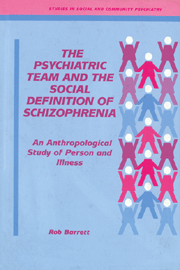 The Psychiatric Team and the Social Definition of Schizophrenia
The Psychiatric Team and the Social Definition of Schizophrenia Published online by Cambridge University Press: 05 August 2016
With its university affiliation, Ridgehaven exemplified a modern psychiatric hospital. It was a site for the accumulation and treatment of patients with mental illness as well as a site for the production of knowledge about mental illness. Between episodes of treating patients, practitioners read journals, undertook research projects, and wrote scientific papers and books about schizophrenia.
The template for institutions such as Ridgehaven, which combined treatment with university teaching and research, was developed in Europe over the course of the previous century. In this chapter I trace the rise of the modern psychiatric hospital from its origins during the late eighteenth century to its subsequent encounter with the university in the late nineteenth century. From this evolving infrastructure, a new moral and scientific discourse on mental illness arose, and schizophrenia was among the most important diagnostic categories to emerge from this discourse. My purpose here is to gain an understanding of the core ideas that comprise schizophrenia by exploring the institutional milieu and intellectual climate within which such ideas first became conceivable. I identify two themes within nineteenth century thought that made it possible for a concept of schizophrenia to emerge. One is a literary-clinical concern with the individual and its obverse, the disintegrated person; the other is a politico-clinical preoccupation with progress and its obverse, degeneration.
This chapter is not intended to be an exhaustive treatment of the origins of psychiatry. Rather, it is a sketch for a history of the present: its focus is limited to the core elements of schizophrenia that have maintained currency, and I conclude the chapter by showing their ongoing relevance for the clinicians and patients of Ridgehaven.
When specifying the historical and cultural underpinnings of schizophrenia, I am not debasing or diminishing the category, nor seeking to reduce it to the status of artifice or fiction. Here I distinguish my approach sharply from Szasz's polemics of schizophrenia as ‘myth’ (Szasz 1973;1976), which rests on a misunderstanding of myth as falsehood and tends to negate the experience of patients by implying that they are lying. By contrast, my approach assumes that patients who report psychotic experiences are not lying. Schizophrenia is not a fabrication. It is a historically constructed category that captures, constitutes, and shapes reality.
To save this book to your Kindle, first ensure [email protected] is added to your Approved Personal Document E-mail List under your Personal Document Settings on the Manage Your Content and Devices page of your Amazon account. Then enter the ‘name’ part of your Kindle email address below. Find out more about saving to your Kindle.
Note you can select to save to either the @free.kindle.com or @kindle.com variations. ‘@free.kindle.com’ emails are free but can only be saved to your device when it is connected to wi-fi. ‘@kindle.com’ emails can be delivered even when you are not connected to wi-fi, but note that service fees apply.
Find out more about the Kindle Personal Document Service.
To save content items to your account, please confirm that you agree to abide by our usage policies. If this is the first time you use this feature, you will be asked to authorise Cambridge Core to connect with your account. Find out more about saving content to Dropbox.
To save content items to your account, please confirm that you agree to abide by our usage policies. If this is the first time you use this feature, you will be asked to authorise Cambridge Core to connect with your account. Find out more about saving content to Google Drive.